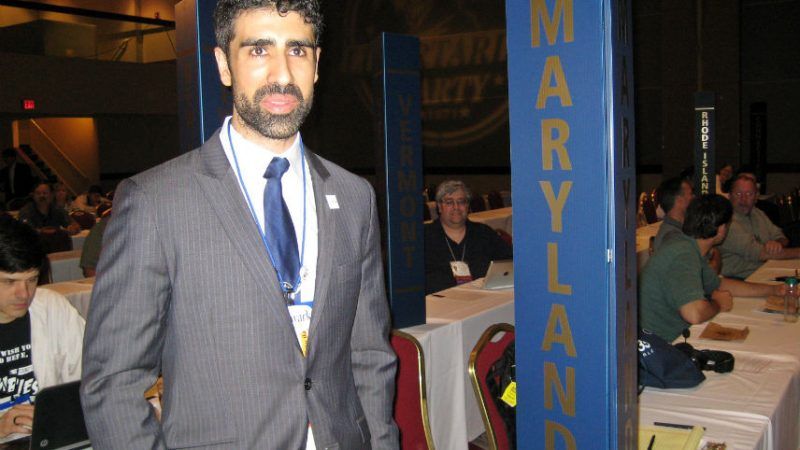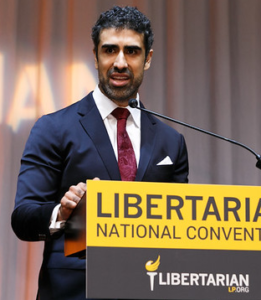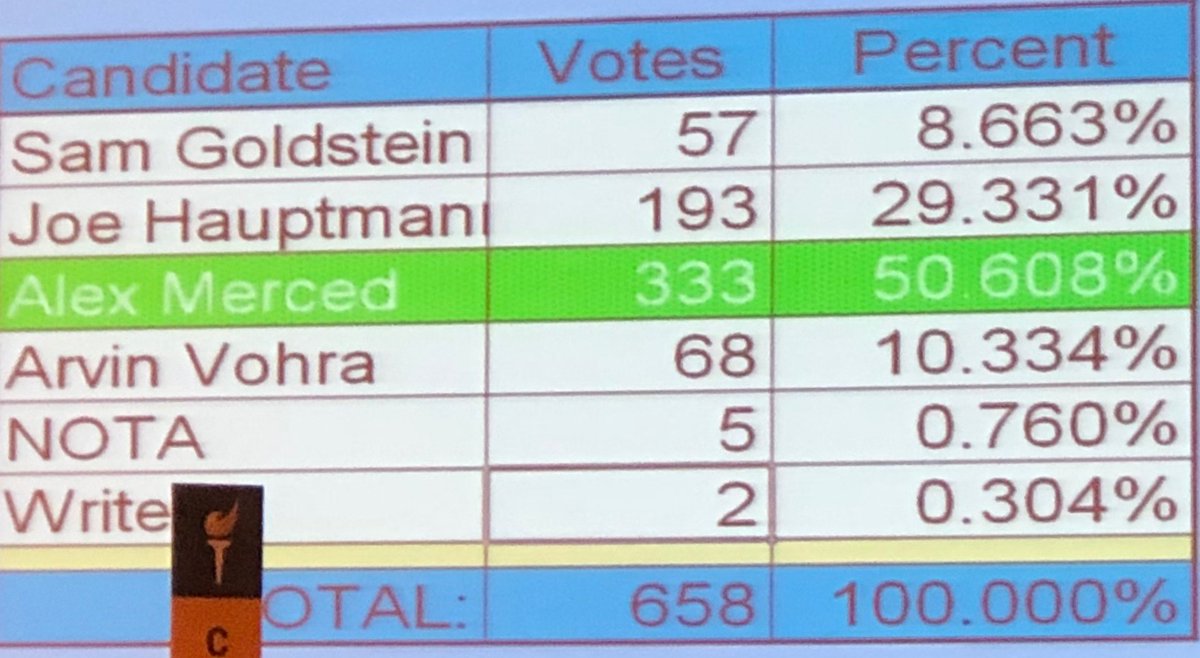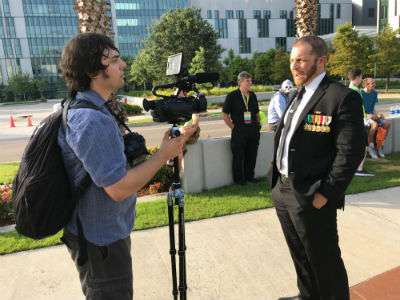Controversialist Arvin Vohra Announces 2020 Libertarian Presidential Run
After being resoundingly voted out of the party's vice-chairmanship over his comments about veterans, school shootings, and age-of-consent laws, the activist/entrepreneur throws his hat in the ring against Adam Kokesh and a presumed Bill Weld.


There will be no shortage of radical anti-statists challenging Bill Weld* or any other former or current major-party elected official thinking about chasing the Libertarian Party's presidential nomination and likely 50-state ballot access in 2020.
Arvin Vohra, a 39-year-old educational entrepreneur notorious for questioning age-of-consent laws for 14-year-olds, for arguing that joining the military to pay for college is "morally unacceptable," and for joking about shooting up school boards, announced at the tail end of the Libertarian Party's biennial national convention that he is running for president. Vohra joins longtime libertarian activist and serial arrestee Adam Kokesh, a 36-year-old Iraq War veteran who is running on a platform to dissolve the federal government, as the two biggest L.P. presidential candidates to officially announce.
"On the first day of my presidency," Vohra tweeted Thursday, "I will pardon those in prison who have neither harmed anyone nor stolen anything. I will start with @Snowden and @RossUlbricht." Next comes "all nonviolent drug users, all nonviolent drug traffickers, all nonviolent drug kingpins…anyone that's in jail for crypto-currency crime [and] gun possession where they didn't actually hurt anybody."
"My number one goal," the candidate tells me, "is to end the welfare state and abolish the income tax. I'm going to be using my campaign to spread that message on the policy level, but also to help people realize there are so many ways to reduce government without changing policy, including opting out of government schools, including using cryptocurrency, including using the power of jury nullification."
Vohra, who served two terms as national vice chair, has been the Libertarian Party's single most controversial figure the past year and a half. In February, he survived attempted suspension and censure motions from the Libertarian National Committee (LNC) over his age-of-consent and military remarks; in April, a second effort to suspend after the school-shooting joke came one vote short. Vohra's self-conscious controversialism—what movement graybeards call the "libertarian macho flash"—was a recurrent, negative theme throughout the three-day national convention.

"When I hear talk about 'edgy approaches,' I feel like saying, 'Been there, done that, already gave the shirt to Goodwill,'" said four-decade L.P. activist Joe Hauptmann during the LNC vice-chair debate, which I moderated. "You're at a cocktail party, and the little old lady comes up to you and says, 'What's a Libertarian? What do you believe?' And you look at her and you say, 'Fuck the state!' You're right, you're right; you've said it concisely, you've said it simply, you feel morally superior. And you have guaranteed there's at least one person who will never cast a vote for a Libertarian!…The only way we get power is with the vote, and there aren't enough of us."
Hauptmann finished in second place to eventual winner (and cheerleader for party unity) Alex Merced in all three rounds of voting. (The ballot after the first round lops off all candidates below 5 percent plus the lowest candidate above that threshold, then euthanizes the low vote-getter in each subsequent round until someone wins a majority.) Merced's percentages progressed from 35 to 44 to 51, Hauptmann's from 25 to 28 to 29, Steve Goldstein's from 16 to 14 to 9; Vohra's limped along at 9–8–10. Party delegates had ample opportunity to weigh in on the incumbent's provocative rhetorical strategy, and the conclusion was unmistakable: two thumbs way down.
Vohra sounds cheerful about seeking his party's presidential nomination after such a snub. "I'm going to be trying to bring a lot of new people into the party," he explains. Also, "a presidential campaign to me is just different from being a vice chair. A vice chair is about kind of half externally focused, half internally focused, and realistically most people objected to my internally focused messaging….A presidential campaign…is 99 percent externally focused, and so the type of messaging that goes into it is just different." In other words, he says he'll tone it down at least a little.
What about Bill Weld, who was bouncing around all over the convention two weeks after receiving a nationally syndicated valentine from George Will? Weld, who in his Republican days served six years as governor of Massachusetts, was the party's vice-presidential pick in 2016.
"I just don't see, based on what he's done in the past, that he's the right choice," Vohra said. "From what I understand, Bill Weld does not support the total abolishment of the welfare state. And that for me is a basic prerequisite for libertarianism. Libertarianism is not something that co-exists with support for the welfare state. Libertarianism means the absolute opposition to all parts of the nanny state and all parts of the welfare state."

Weld has admittedly moved more libertarian since his 2016 vice presidential run, particularly on the issues of guns, drugs, and war. But in a somewhat tepid VIP speech Sunday (the audience Q&A was much feistier) he still sounded like a somewhat more bold version of a 1990s moderate Republican governor, talking about deficit reduction, flat taxes, privatization, and sentencing reform. Though he did have some kind words for Kokesh, who earlier in the year had been bumrushing Weld on the state-convention circuit.
"Adam is a very smart young man," the former governor said. "I'm halfway through his book and it's a work of substantial intelligence." (Vohra is also a Kokesh fan: "Adam and I have a lot of similarities, and I have a huge amount of respect for him. Honestly, if I wasn't running, I'd probably support him, and honestly I do support him. I think he has a lot of great positions. I think he does a lot of good work.")
Kokesh, who during the convention put on a "March for Dead Veterans" past the local V.A. hospital (you can watch some of my footage here), returned the favor, with the caveat that Vohra's provocative comments about military service were "unnecessarily abrasive and pushed away some of the people most likely to join" the party.
"I really admire Arvin's passion for the cause of freedom, I respect the work he has put in, and I think overall he is a great asset to the movement," he told me. "My only major disagreement with him that I know of stems from his strategy based on the idea—if I understand it correctly—of pushing people away who he thinks are not ready to hear the message. Every human being on earth is ready to hear the message of freedom."
* After this post was initially published, Weld sent along a statement: "With two years to go before the presidential election, any number of candidates will likely emerge, and as usual, there will be a robust competition for the nomination. That is as it should be."
Will longtime Libertarian Party–builders have the stomach to watch a candidate lead every conversation with legalizing cocaine and automatic weapons and abolishing the welfare-warfare state? "I imagine that things that I've said have driven away some people," Vohra acknowledges. But he thinks "they've also attracted some people." At the vice-chair debate, much of which centered around Vohra's antics of the past 18 months, he maintained that "if you are being deliberately controversial, with the right mindset, you can create a huge amount of free media….You can start to actually change, not just pander to, hearts and minds. And you actually put forth the ideas of the libertarian movement."
Vohra's more successful competitors had a different view: "For 40 years we've been saying 'It's all or nothing!' And we've got exactly what we've demanded: nothing," Hauptmann said. "We've lived in our own echo chamber for 40 years. We have people out there who when you say 'Taxation is theft,' their eyes glaze over. You cannot take a person who has spent their entire life chained to a hospital bed, and say 'Yes, you can run a marathon! Let's go!'…Government is too damn big. But the other problem is, we're too damn small."
Nick Gillespie interviewed Vohra back before the 2014 midterms:


Show Comments (210)